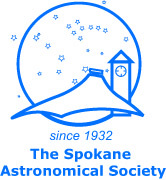TIME
Don’t forget to set your watch!
WEATHER
Clear Sky Charts are an amazingly accurate tool that give forecast information for Cloud Cover, Sky Transparency, Seeing Conditions and Darkness. For instructions on reading the clocks or finding out more about them just click on a black area of the clock.
Space Weather
SpaceWeather.com News and information about the Sun-Earth environment.
What’s Up Tonight?
JPL Space Calendar An AMAZING collection of day by day observing highlights. Be sure to look here before heading out! CalSky Celestial Observer. “The most complete astronomical observation and information online calculator on the planet.” Abrams Planetarium Your Sky Star Chart Generator.
Earth’s Atmosphere
Atmospheric Phenomena -Site describes everything from Rainbows to Glories to Green and Red Flash. Atmospheric Optics -Site similar to the one above but also includes Clouds, Lightning, Weather, Rain, Snow and Ice. Aurora Oval -Shows the location of strongest Auroral Activity. An activity level of 4 (four) or higher is needed to see Aurora in the Spokane area. Updated every 10 minutes. Geomagnetic (Kp index) Activity -A Kp reading of 4 (four) or higher is needed to see Aorora in the Spokane Area. When the Kp index and the Aurora Oval both show readings of 4 (four) or higher then Aurora is visible from a dark site. Updated every 15 minutes.
Earth Orbit
Heavens-Above -Site that lists pass times and locations for satellites including ISS, Space Shuttle (when in orbit), Iridium Flares and many others. Use Lat=47.659, Lng=-117.425; Alt=562; TZ=PST. Any point on Earth can be used as the observing location by entering lat&long coordinates. U.S. Naval Observatory Sun and Moon Data A.L.P.O. Association of Lunar and Planetary Observers The Hitchhiker’s Guide to the Moon A guide to telescopic observations of the moon. tinyurl.com/ISS-Spokane International Space Station Observable Times
Solar System
The Sun Stanford Solar Center -Providing Solar On-Line Activity Resources for the joy of solar science exploration. SpaceWeather.com -Science news and information about the Sun-Earth environment. Current Solar Data -Data from both space based and ground based observatories. Eclipse Homepage -Everything you ever wanted to know. Courtesy of Nasa’s Goddard Space Flight Center and Fred Espenak. Solar-Terrestrial Dispatch -Space Weather Specialists. Solar Observing FAQ -Learn about Safe solar observing.
Comets, Asteroids & Meteors Solar System Loads of comet information from JPL. Comets and Meteor Showers Gary Kronk’s site provides news, information, professional & amateur observations and historical research. Skyhound.com Skyhound’s Observers pages provide some excellent and detailed comet information. Leonid Meteor Calculator and Observing Info
Mercury Mercury -SEDS site for planet Mercury facts and information. Mercury -USGS Astrogeology page on Mercury.
Venus Venus -SEDS site for planet Venus facts and information. Venus -USGS Astrogeology page on Venus.
Earth Earth -SEDS site for planet Earth facts and information. Earth -USGS Astrogeology page on Earth.
Mars Mars -SEDS site for planet Mars facts and information. Mars -USGS Astrogeology page on Mars.
Jupiter Jupiter -SEDS site for Jupiter facts and information. Jupiter -USGS Astrogeology page on Jupiter.
Saturn Saturn -SEDS site for Saturn facts and information. Saturn -USGS Astrogeology page on Saturn.
Uranus Uranus -SEDS site for Uranus facts and information. Uranus -USGS Astrogeology page on Uranus.
Neptune Neptune -SEDS site for Neptune facts and information. Neptune -USGS Astrogeology page on Neptune.
Pluto Pluto -SEDS site for Pluto facts and information. Pluto -USGS Astrogeology page on Pluto.
Deep Sky
NGC catalog The Interactive NGC Catalog Online The AINTNO 100 Think you’ve seen it all? Here are a few items in the sky you may have missed! (AAVSO) American Association of Variable Star Observers



